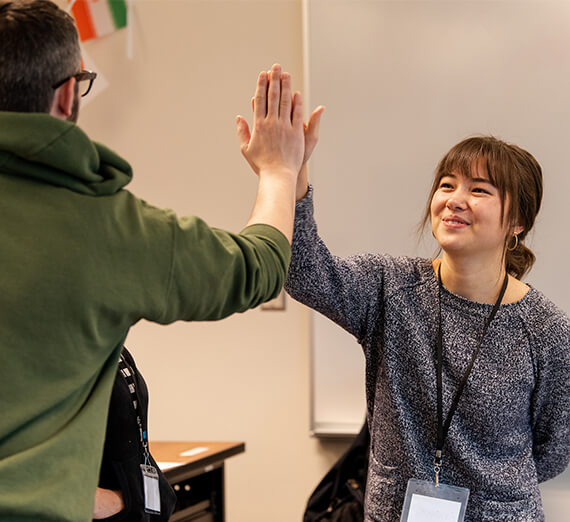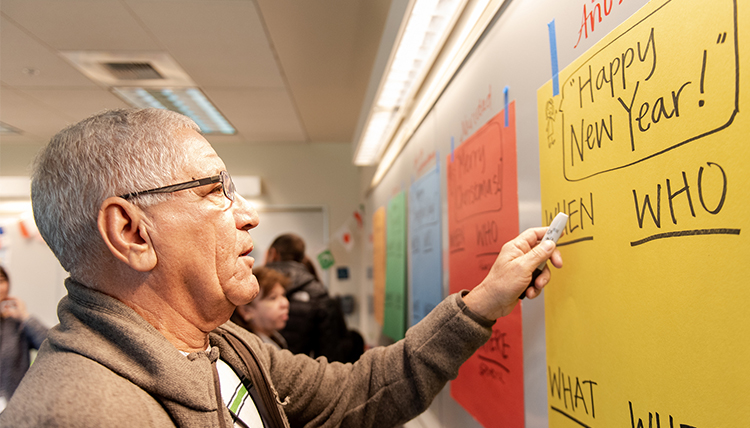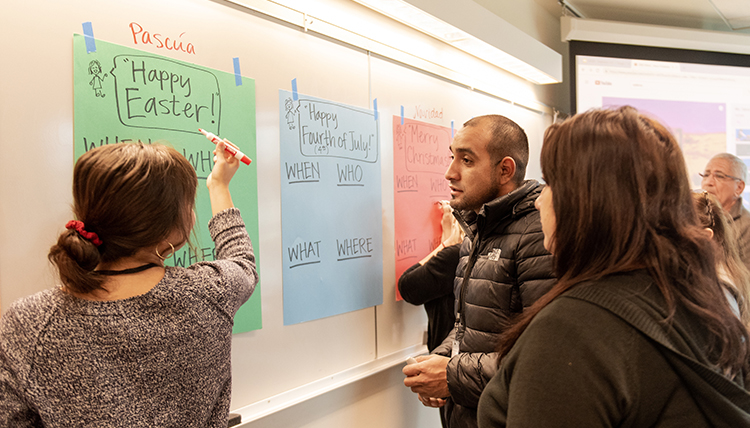Building a Learning Community for Immigrants & Refugees

“Latinos are friendly and funny people.”
“We want Americans to welcome us.”
Those are some of the sentiments shared by participants of English-language learning classes offered at Gonzaga. Established in 2012, Gonzaga ESL Community Outreach (GECO) is a community-based program which provides free English as a Second Language (ESL) classes weekly to immigrant and refugee adults in Spokane. GECO is organized and taught by graduate students in GU’s Master of Arts in Teaching English to Speakers of Other Languages (MA/TESOL) program, allowing them to gain valuable teaching and leadership experience while engaging with the community.
GECO was originally intended as an environment for Gonzaga students to develop professionally; however, it has also become a venue for immigrants to develop professionally and personally. In spring 2018, eight immigrants and refugees, along with two MA/TESOL students, participated as speakers on a panel at Gonzaga University’s Student Research Leadership symposium. They shared stories about how they are leaders in their new-found communities in the U.S., and how learning English propels them to make changes for their communities. Gonzaga students participated in a discussion with immigrants and refugees about how to interact with the police, what to do if they are pulled-over, and why people are sometimes treated differently. From the discussion, we learned vast differences in culturally acceptable behavior and created a list of tips. One student shared the tips with his community because he wanted to keep everyone informed and safe. This GECO student’s leadership is one of numerous examples of class lessons and conversations transcending the classroom into the community at-large.
Every Saturday, Gonzaga students and Spokane immigrants and refugees gather in the Rosauer Center to learn together.
Though the majority of the Gonzaga students are from the United States, GECO students represent more than 20 other countries, including Belarus, Chile, Ghana, Haiti, India, Kazakhstan, Peru, Taiwan, Uruguay, Ethiopia, Marshall Islands, Russia, Saudi Arabia, Sudan, Syria, Ukraine, Venezuela, Vietnam, Afghanistan, Mexico and Brazil. Primarily focusing on language learning, the content revolves around English necessary for daily living in America, and as such, culture is a consistent topic in the classroom.
Over the past two years, there has been a shift in the mood when immigration politics come up in class. Where these topics once evinced hope, now feelings of fear, discrimination and uncertainty are most often voiced. Though some educators may recommend leaving politics at the door, the GECO format creates an environment of intercultural exchange, allowing Gonzaga students to learn from the experiences of immigrants just as much as immigrants can learn from the Gonzaga students.
Voices from the GECO Teachers
What have you learned from refugee and immigrants (GECO students)?
“I have witnessed their determination. I have also learned that each one has a unique life experience and they have a lot to teach and contribute. They have a wealth of knowledge, and we are only there to give them the tools to share that knowledge in English.”
What have GECO students learned from you?
“I think they are able to see Americans are happy to have them, by our willingness to spend time with them each week.”
What is one thing you want to tell GECO students about Americans?
“Despite all the issues, they are always welcome in here, and that for every person who opposes [illegal] immigration, there are at least 10 who open their hearts and arms to welcome them.” . . . “I want to tell them they are wanted and have every right to be successful here.”
Voices from the GECO Students
What have you learned from the GECO teachers about Americans?
“A lot of American people like to help other people to adapt to this country and they do it without money, like volunteers, and this is very important for us.”
“They are respect[ful], honest, helpful, friendly people.”
What have GECO teachers learned from you?”
“[They have learned] how we enjoy life [and] have fun. How we have fun is different. We dance, and our birthdays and celebrations, they are so different. [Celebrations are] very big.”
“[They have learned that to us] the family is more lov[ing] and united. Family is very important.”
What do you want to tell Americans about your people or culture?
“Latinos are friendly and funny people.”
“We want Americans to welcome us.”
While our national news focuses largely on the many challenges of immigration, GECO puts the focus on the care of migrants and refugees living in our local community. It allows their voices to be heard and for their stories to influence many who otherwise would not have the opportunity to learn in this way. GECO is a community that celebrates our common humanity and supports dignity for all.
Learn more about the English Language Center here.


